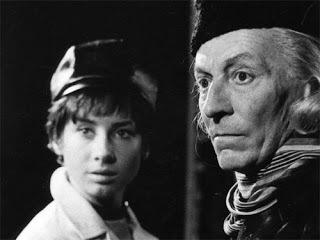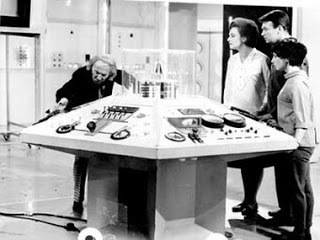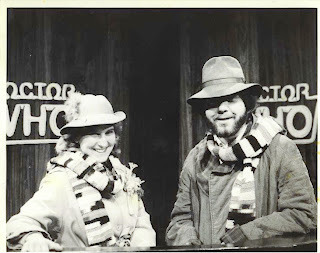Who, at the Beginning
I have a soft spot for the current incarnation of the British show Doctor Who that can be distilled down to a comment made by the title character during the recent Christmas special. When told by a villainous type than someone "wasn't important," the Doctor replied, "I've never met anyone who wasn't important." That sort of unabashed optimism and compassion, especially when so much TV SF tends toward the downbeat and dystopian, really appeals to me.
So I decided to check out the original episodes of the original show, made and broadcast in 1963 (the same year I was made and broadcast). The first episode, the Ur-Who if you will, is called "An Unearthly Child." And in it, you will see nothing of the show that's so popular now.
Well, that's not true. There's the T.A.R.D.I.S., still in the form of a police call box. But there's no sonic screwdriver. The Doctor is revealed to be an alien, but he's a crotchety old man with an equally alien teenage granddaughter in tow. Susan, for reasons not really revealed in the first eleven episodes (where I stopped), is enamored of Earth in the twentieth century and tries to blend in at the local school. Two of her teachers, Ian and Barbara, decide to find out why she gave the school a phony address, and end up antagonizing the Doctor (not hard to do) into proving the T.A.R.D.I.S. is real. First they travel into the past and run afoul of cavemen, then to the future where for the first time they meet the Doctor's greatest enemies, the Daleks.

The dynamics are so vastly different that it's hard to believe the current Doctor (Matt Smith) is actually supposed to be part of the same continuity. Made as a children's show, the audience identification figure is Susan, while authority is represented by Ian and Barbara, two gigantically annoying companions. The Doctor is the anarchic wild card, omnipotent one moment and completely at a loss the next. Further, the humanistic determination to help those in need that characterizes the recent Doctor(s) is completely missing. This original Doctor is quite willing to run away, abandon Ian and Barbara (can't argue with that, really) and look out for himself and Susan at the expense of anyone else. And yet he's not the total dickweed this makes him sound like; he abhors violence, is resourceful in a pinch and, as played by William Hartnell, is generally a hoot to watch. There's none of David Tennant's wide-eyed lunacy, or Matt Smith's quirky body language, but he conveys how fast the Doctor's brain works and how tedious normal people must be to him.

Ten Doctors later, there's virtually nothing from this original conception left in the show beyond the T.A.R.D.I.S. The new show has a budget, terrific special effects and casts that can bring this goofy universe to thrilling life. Yet there's something delightful in the original concept of a bad-tempered, super-intelligent alien dragging his granddaughter's snooty teachers through space and time for no good reason. While it seems unlikely that the current run of young, handsome Doctors will end anytime soon, I have a sneaking wish for a return to Hartnell's conception. It's in the same wish box that has Michael Keaton in a film version of The Dark Knight Returns and Alec Guinness playing Obi-Wan Kenobi in Lucas' original concept as Ben Grimm from Treasure Island. None of them will ever happen. But thinking about them sure is fun.

This is me and Suzie Hunt on the campus PBS station circa 1983, hosting a fundraiser during the broadcast of The Five Doctors. I was chosen for this because I was one of the few people at UT-Martin who'd ever heard of Who.
So I decided to check out the original episodes of the original show, made and broadcast in 1963 (the same year I was made and broadcast). The first episode, the Ur-Who if you will, is called "An Unearthly Child." And in it, you will see nothing of the show that's so popular now.
Well, that's not true. There's the T.A.R.D.I.S., still in the form of a police call box. But there's no sonic screwdriver. The Doctor is revealed to be an alien, but he's a crotchety old man with an equally alien teenage granddaughter in tow. Susan, for reasons not really revealed in the first eleven episodes (where I stopped), is enamored of Earth in the twentieth century and tries to blend in at the local school. Two of her teachers, Ian and Barbara, decide to find out why she gave the school a phony address, and end up antagonizing the Doctor (not hard to do) into proving the T.A.R.D.I.S. is real. First they travel into the past and run afoul of cavemen, then to the future where for the first time they meet the Doctor's greatest enemies, the Daleks.

The dynamics are so vastly different that it's hard to believe the current Doctor (Matt Smith) is actually supposed to be part of the same continuity. Made as a children's show, the audience identification figure is Susan, while authority is represented by Ian and Barbara, two gigantically annoying companions. The Doctor is the anarchic wild card, omnipotent one moment and completely at a loss the next. Further, the humanistic determination to help those in need that characterizes the recent Doctor(s) is completely missing. This original Doctor is quite willing to run away, abandon Ian and Barbara (can't argue with that, really) and look out for himself and Susan at the expense of anyone else. And yet he's not the total dickweed this makes him sound like; he abhors violence, is resourceful in a pinch and, as played by William Hartnell, is generally a hoot to watch. There's none of David Tennant's wide-eyed lunacy, or Matt Smith's quirky body language, but he conveys how fast the Doctor's brain works and how tedious normal people must be to him.

Ten Doctors later, there's virtually nothing from this original conception left in the show beyond the T.A.R.D.I.S. The new show has a budget, terrific special effects and casts that can bring this goofy universe to thrilling life. Yet there's something delightful in the original concept of a bad-tempered, super-intelligent alien dragging his granddaughter's snooty teachers through space and time for no good reason. While it seems unlikely that the current run of young, handsome Doctors will end anytime soon, I have a sneaking wish for a return to Hartnell's conception. It's in the same wish box that has Michael Keaton in a film version of The Dark Knight Returns and Alec Guinness playing Obi-Wan Kenobi in Lucas' original concept as Ben Grimm from Treasure Island. None of them will ever happen. But thinking about them sure is fun.

This is me and Suzie Hunt on the campus PBS station circa 1983, hosting a fundraiser during the broadcast of The Five Doctors. I was chosen for this because I was one of the few people at UT-Martin who'd ever heard of Who.
Published on January 15, 2011 03:01
No comments have been added yet.



